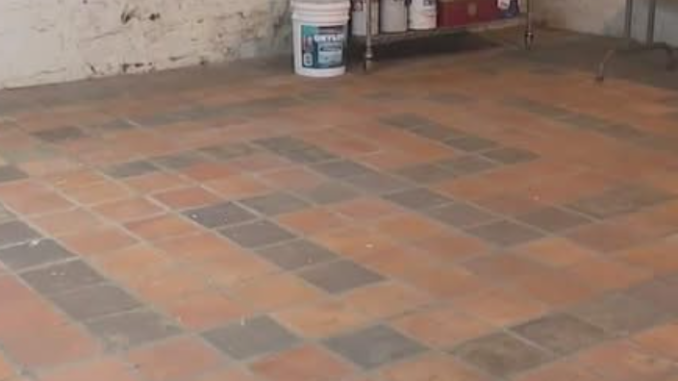
After buying a home in Beaver County, Pennsylvania, a couple says they were appalled when they found a swastika permanently tiled into the basement floor. The couple thinks the hate symbol was intentionally hidden during their home inspection.
Now, they’re suing the seller.
[snip]
They also discovered what appears to be a German war Eagle in the tiles.
Stoner says the hate symbols inside his client’s home constitute more than just psychological damage. Unlike a past crime happening inside a home, these symbols are a physical feature still in the home, more closely resembling an act of vandalism, he said. That would be considered damage, and ultimately, a ‘material defect’ that his clients were entitled to know about before purchasing.
“It’s mine now, and I don’t want it, but it’s mine. I own it, which is horrific,” homeowner Lynn Rae Wentworth said.
[snip]
But months after moving in, Wentworth says she was in the basement with her nephew, working to clean up a few things left behind by the seller. It wasn’t until they removed a large rug and table that they found a very big problem.
“I was like, ‘There’s something tiled into the floor here,’ and you take a step over here and you’re like, ‘Oh my gosh. This is a swastika.'”
Nearly six feet in diameter, the swastika, and what appears to be a German war Eagle, were discovered, permanently tiled into the floor.
“I was just shocked, mortified,” Wentworth said.
“We believe this is something that should have been disclosed to them from the start, and they should have been given the option as to whether or not this is something they would want and to be in their home,” Stoner said.
Seller argues the symbols are cosmetic features
[snip]
“The explanation that they gave, basically, is that the swastika is an ancient symbol that means many different things in many different cultures, and in most cultures, it’s a positive thing,” Stoner said.
In court paperwork, the seller’s attorney also argues the Wentworths had full access to the home before buying and could have moved the table and rug at any time to discover what was underneath.
“They’re claiming, basically, that this is just a cosmetic feature of the house. It doesn’t constitute a defect, and therefore, they didn’t have to disclose that to them. That is their position,” Stoner said.
The Wentworths disagree, saying they may not have purchased the home had they known.
[snip]
They say they believe the seller intentionally hid the symbols, knowing it could be a problem.
“I mean, why would they have kept the rug when they were cleaning out? Why would you set a table right smack dab over something unless you were hiding it,” Wentworth argued.
Stoner says this case is the first of its kind in Pennsylvania, and says the Wentworths want to see the law changed, making it a crime not to disclose permanently-installed hate symbols in a home.
[snip]
Wentworth compares this situation to when Beaver Borough Police acted swiftly to remove and condemn swastikas spray-painted on a building earlier this year.
“They posted about it’s going to be removed as soon as possible, right? Nobody was saying, ‘Hey, this is okay. This isn’t a material defect.’ The response was, as it should have been, ‘Let’s get this out of here. Let’s remove it. This is an inappropriate symbol,'” Wentworth said.
Stoner has now made an appeal and made arguments in front of the Superior Court and is now waiting for an opinion, expected in the next few months.
[snip]
In the original lawsuit, the Wentworths were asking the seller to pay for the costs necessary to replace the floor: around $30,000.
KDKA-TV reached out to the seller’s attorney, Albert Toerrence, for comment on the case. He responded, saying, “It’s best to wait until the court decides.”
Home inspector shares crucial tips
Caveat emptor: Buyer beware.
It’s a phrase house hunters have to get familiar with, and a risk they accept when it comes to buying a house in Pennsylvania.
The vast majority of home buyers will never uncover something like a swastika set into the floor tiles, like the Wentworths found in their home, and sellers have to disclose defects they know about.
[snip]
But buyers are still responsible for finding potential issues in the property before they sign on the dotted line.
Papinchak walked KDKA-TV through an Airbnb in Highland Park to demonstrate what inspectors can and can’t help potential buyers uncover in their dream home.
“As a home inspector, we’re not allowed to move, manipulate furnishings,” Papinchak said.
[snip]
Papinchak says no home inspector would’ve found something like that.
“I wouldn’t be moving this table, lifting the rug. I wouldn’t be moving this couch to be able to understand what the floor condition is, or if there were any defects that would be relevant,” Papinchak said.
When you’re walking through your potential home, don’t expect your inspector to shift a bookcase or haul away a rug to check for hidden problems.
[snip]
If you do think there’s a sofa or carpet that’s oddly placed and could be hiding something, you can ask your real estate agent to contact the seller.
“Would it be possible for you folks to remove the furniture, or could the buyer come through and remove the furniture?” Papinchak described.
[snip]
“Are there any concerns or any repairs or replacement items that we’re recommending in our inspection report?” Papinchak explained.
Hiring a home inspector is part of doing your due diligence as a house hunter.
“It’s like when people put that fresh coat of paint, it’s almost like a reset, and it can really conceal what actually is happening,” Papinchak said.
When you sign that contract, it’s buyer beware.